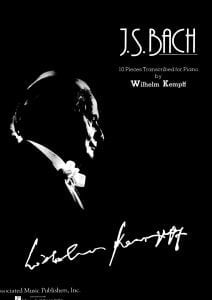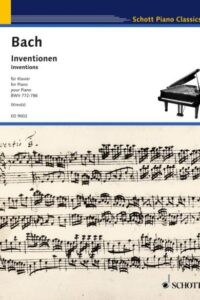Table of Contents
Come join us now, and enjoy playing your beloved music and browse through great scores of every level and styles!
Can’t find the songbook you’re looking for? Please, email us at: sheetmusiclibrarypdf@gmail.com We’d like to help you!
Wilhelm Kempff performing various Bach’s transcriptions (1975)
0:00 : Largo du Concerto pour clavecin en fa mineur (BWV 1056)
3:42 : Choral-Prelude ”Nun komm’ der Heiden Heiland” (BWV 659)
8:14 : Choral-Prelude ”Es ist gewisslich an der Zeit” (BWV 307 et 734
10:55 : Sicilienne en sol mineur, extraite de la 2e Sonate pour flute (BWV 1031)
14:34 : Choral-Orgue ”Befiehl du deine Wege” (BWV 727)
16:45 : Choral de la Cantate Herz und Mund und Tat und Leben – ”wohl mir, dass ich Jesum habe” (BWV 147 ”Jesus, que ma joie demeure” no.6)
20:08 : Choral-Prelude ”In dulci jubilo” (BWV 751)
22:17 : Prélude de la Cantate pour I’election du Conseil – ”Wir danken dir, Gott, wir danken dir” (BWV 29)
26:52 : Choral-Prelude ”Wachet auf, ruft uns die Stimme” (d’apres BWV 140 no.4 ”Choral du veilleur”)
31:42 : Choral-Prelude ”Ich ruf zu dir, Herr Jesu Christ” (BWV 639)
34:12 : Gluck – Plainte d’Orphee (Musique de ballet tiree de ”Orphee et Eurydice”)
37:14 : Danse des ombres heureuses (Musique de ballet tiree de ”Orphee et Eurydice”)

Please, subscribe to our Library.
If you are already a subscriber, please, check our NEW SCORES’ page every month for new sheet music. THANK YOU!

Best Sheet Music download from our Library.
Browse in the Library:
Or browse in the categories menus & download the Library Catalog PDF:


Who was Wilhelm Kempff?
Wilhelm Kempff (25 November 1895 – 23 May 1991) was one of the most revered and influential German pianists and composers of the 20th century, particularly celebrated for his profound interpretations of the German Romantic repertoire, especially Beethoven and Schubert.
Here are the key aspects of his life and legacy:
- Early Life & Training:
- Born in Jüterbog, Germany, into a family of church musicians.
- A child prodigy, he studied piano and composition at the Berlin Hochschule für Musik and later philosophy and music history at the University of Berlin.
- Made his professional debut in 1917, quickly gaining recognition.
- Core Repertoire & Style:
- Beethoven: Kempff is considered one of the definitive interpreters of Beethoven. His recordings of the complete piano sonatas and concertos (especially his stereo cycles for Deutsche Grammophon) remain benchmarks, renowned for their intellectual depth, lyrical beauty, structural clarity, and spiritual quality. He avoided excessive virtuosic display, focusing instead on the music’s inner poetry and humanity.
- Schubert: His interpretations of Schubert’s sonatas and impromptus are legendary for their singing tone, natural phrasing, and profound sense of melancholy and lyricism. He captured the unique blend of innocence and depth in Schubert’s music like few others.
- Schumann & Brahms: He was also highly regarded for his performances of Schumann (e.g., Fantasie, Kreisleriana) and Brahms (concertos, late piano pieces).
- Bach: He frequently played Bach (often on the harpsichord in earlier years) and Mozart, bringing characteristic clarity and expressiveness.
- Style: Kempff’s playing was characterized by:
- Lyrical, Singing Tone: A beautiful, rounded sound, often described as “vocal.”
- Poetic Insight: Deep sensitivity and an ability to convey the emotional and spiritual core of the music.
- Structural Clarity: Masterful control of line, phrasing, and architecture without sounding rigid.
- Spontaneity & Nobility: A sense of natural flow combined with a dignified, unmannered approach.
- Avoidance of Superficial Virtuosity: He prioritized musical expression over technical showmanship.
- Recordings:
- Kempff left an extensive discography, primarily for Deutsche Grammophon and Decca.
- His stereo recordings of Beethoven’s complete piano sonatas and concertos (with the Berlin Philharmonic under Paul van Kempen and Ferdinand Leitner) are considered among the most essential recordings of this repertoire ever made.
- His Schubert sonata recordings are equally iconic.
- Many of these recordings have been continuously in print for decades, a testament to their enduring popularity and critical acclaim.
- Teaching:
- He was a dedicated and influential teacher.
- In 1957, he founded the Beethoven Courses in his summer villa in Positano, Italy, which later became the Kempff Kulturstiftung (Kempff Cultural Foundation). These masterclasses attracted generations of international pianists until his death.
- Compositions:
- Kempff was also a composer, writing in a late-Romantic style. His output includes symphonies, operas, concertos, chamber music, and choral works. While respected, his compositions are performed far less frequently than his interpretations of the standard repertoire.
- Legacy:
- Kempff is remembered as a pianist of immense integrity, humility, and deep spirituality. His playing was seen as a direct channel to the composer’s intent.
- He is often placed among the greatest pianists of the century (alongside figures like Rubinstein, Horowitz, Richter, and Gilels) for his unique blend of intellectual rigor, poetic sensitivity, and timeless musicality.
- His Beethoven and Schubert interpretations continue to be touchstones for pianists and listeners alike, prized for their warmth, humanity, and profound understanding. He performed publicly well into his 80s.
In essence, Wilhelm Kempff was a master musician whose recordings, particularly of Beethoven and Schubert, offer some of the most deeply satisfying and spiritually resonant experiences in the entire piano literature. His legacy as an interpreter endures powerfully.
